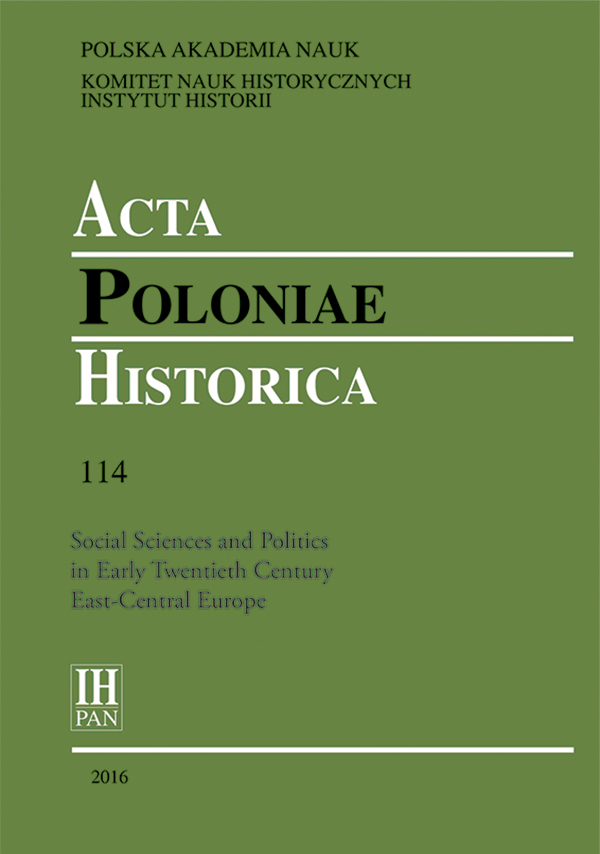Eugenics on the Periphery: Or Why a ‘Belarusian Eugenic Project’ Did Not Come True (1918–44)
DOI:
https://doi.org/10.12775/APH.2016.114.03Keywords
eugenics, health care, family policy, Nazi crimes, racial hygiene, sterilization, propaganda, biology, psychiatry, abortionAbstract
The interwar period was characterized by the active development of national eugenics projects in Europe. A number of factors contributed to the interest in eugenics and the desire to implement them: the making of new states and consolidation of nations in East Central Europe, the need to overcome the legacy of the Great War and deal with social problems (for example, venereal diseases and prostitution), and the development of scientific and international academic contacts. Belarusian debates on eugenics took place mostly on the periphery of the more developed discourses – those in Russia, Poland, and, later on, in Germany. The Russian scholars in the larger university centres contributed to the development of the Soviet eugenics project, which gained the support of the Soviet authorities. In the first decade of their rule, the Bolsheviks were not against debates on eugenics about how to improve the ‘nature of man’. The Soviet eugenics project, which focused on studying problems of heredity, genetics, and genealogy, was stopped when the authorities placed rigid ideological controls over science. In Soviet Belarus, no academic circle appeared that engaged in the debates on eugenics. The development of the eugenics movement in Poland was closely linked to the formation of the newly established Polish state. After the Great War, the Polish eugenics movement made attempts to integrate itself into the public life of the country. Polish medical doctors contributed to the development of the eugenics movement. During the Second World War, a group of Belarusian nationalists tried to formulate a basis for a Belarusian racial eugenics project, following the main ideas of Nazi ‘racial hygiene’.References
Adams Mark (ed.), The Wellborn Science. Eugenics in Germany, France, Brazil and Russia (New York and Oxford 1990).
Chiari Bernhard, Alltag hinter der Front. Besatzung, Kollaboration und Widerstand in Weißrussland 1941–1944 (Düsseldorf, 1998).
Felder Björn and Weindling Paul (eds.), Baltic Eugenics. Bio-Politics, Race and Nation in Interwar Estonia, Latvia and Lithuania 1918–1940 (Amsterdam and New York, 2013).
Friedman Alexander and Hudemann Rainer (eds.), Diskriminiert – vernichtet – vergessen. Behinderte in der Sowjetunion, unter nationalsozialistischer Okkupation und im Ostblock 1917–1991 (Stuttgart, 2016).
Gawin Magdalena and Uzarczyk Kamila (eds.), Eugenika – biopolityka – państwo: z historii europejskich ruchów eugenicznych w pierwszej połowie XX w. (Warszawa, 2010).
Gerlach Christian, Kalkulierte Morde. Die deutsche Wirtschaftsund Vernichtungspolitik in Weißrußland 1941 bis 1944 (Hamburg, 1998).
Górny Maciej, Wielka wojna profesorów : nauki o człowieku (1912–1923) (Warszawa, 2014).
Krementsov Nikolaĭ, ‘From “Beastly Philosophy” to Medical Genetics: Eugenics in Russia and the Soviet Union’, Annals of Science, lxviii, 1 (2011), 61–92.
Soĭfer Valeriĭ, Vlast’ i nauka. Razgrom kommunistami genetiki v SSSR (Moskva, 2002).
Downloads
Published
How to Cite
Issue
Section
License
Title, logo and layout of journal are reserved trademarks of APH.Stats
Number of views and downloads: 346
Number of citations: 1



